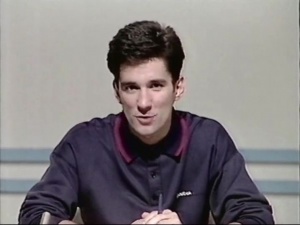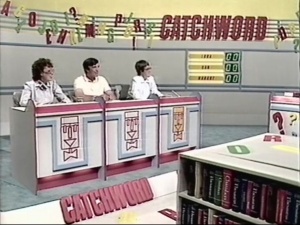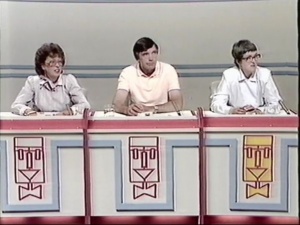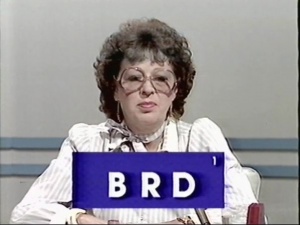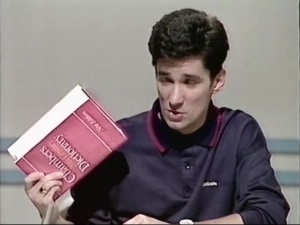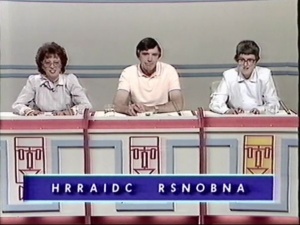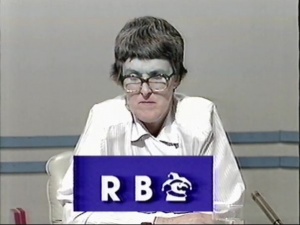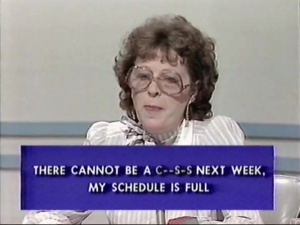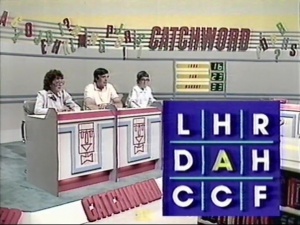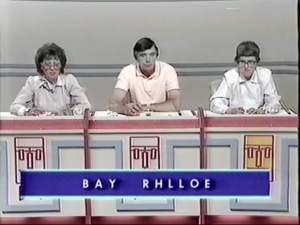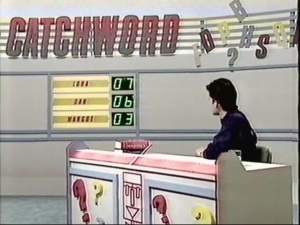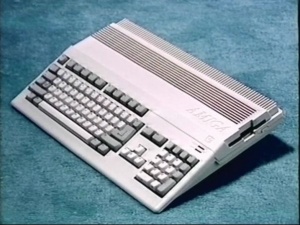Weaver's Week 2023-09-24
(Created page with 'Last week | Weaver's Week Index | Next week We had hoped this Week would discuss ''My Mum, Your Dad''…')
Current revision as of 10:28, 24 September 2023
Last week | Weaver's Week Index | Next week
We had hoped this Week would discuss My Mum, Your Dad, the ITV dating show where grown-up children "help" their parents find a romantic link. But we have one problem: it's not a game show. It is completely bereft of prize, competition, or anything that we can honestly call a challenge. Davina McCall is in her element, but this column has no angle.
In its place, we delve into the archives for a great standby show.
Contents |
Catchword
BBC Scotland, 1988 – 1995
It's a pleasure to be able to say to you — I'm not Gyles Brandreth!
Catchword first appeared in summer 1985, as a short pilot series hosted by the bejumpered wordsmith. When they commissioned a full series a few years later, Gyles was replaced with someone far more affable, Paul Coia.
Back in 1988, the early afternoon battle for adult viewers was between BBC2 and Channel 4 – both BBC1 and ITV had programmes for children in the 4pm hour, inviting anyone who remembered the farthing to watch something else. And, during the winter, there are a lot of people at home and at a loose end at 4pm. Catchphrase went out on BBC2 at 4pm, perhaps intended as a spoiler for Countdown over on Channel 4 – they weren't to know that Channel 4 had Fifteen-to-One up its sleeve, and that certainly wasn't a word game.
Every game show needs a back story. Some are complex (watch Mission 2110 or Last Commanders). Some are simple (see The Crystal Maze or Gladiators). Some back stories are so thin we'll mistake them for lace, like on Catchword. Bryan the computer asks three contestants to name some words, and unscramble some anagrams, and fill in some quotes. That's it, that's the show's back story.
So we meet the three contestants, in quite some detail – almost three minutes of chitter-chatter on the sample episodes we've seen. Of course, if the main game needed a bit more time to play out, they'd chop the chat down. Only after Paul's chatted to all the contenders do we get into the word game.
The four-second word game is incredibly simple. Three consonants will appear at random, and the contender is to say any word. Their word must begin with the first letter shown, and feature the other two in order.
So, for instance, suppose Bryan throws out the letters B-R-D. We're looking for a word that begins with B, then has an R and a D in that order. BRiDge, for instance, or BRiDe. They'll allow BodyguaRD, because the letters appear in the right order – the earlier "d" is disregarded. BiodegRaDable, that's another possibility – and might help win the bonus points for the longest word in the round.
But our players have just four seconds to begin their answer, then the letters disappear, replaced by the next set. That's why it's a four-second word game – a game, about words, with four seconds to think. Catchword may have had many great points, but poetic round names were not its strong point.
In the game, it's one point for each valid word, and the three bonus marks for the longest word – three each if two players tie. Paul will check the answers against the Chambers dictionaries.
Scores for the round are kept on a board at the side of the set – Paul literally has to turn and look at the scores. Why are the scores not displayed beneath each contestant's desk? They need the space for later rounds, and also for a picture of Bryan the computer – a smiling robot head wearing a bow tie.
It's the Hall of Fame next. Ten people who are linked by something – in this sample episode, they're all millionaires. Could be dead, could be alive, could be fictional, all are worth a million quid. Oh, and the names are in anagram form, first name and last name separated. One point for each name correctly named, nothing away for an incorrect buzz, and Paul will give some gentle hints to help the players get the name if they're stumped.
"It's All Yours" is the next round. Our contestant is given three letters, and thirty seconds to make as many distinct words as possible. Same rule as the Four Second Word Game earlier – start with the first letter, contain the other two in order. Great news if you get a flexible set like RNS, horrible if Bryan throws up FHV where "fishwives" and "flashovers" are about the only possible solutions.
From time to time, Bryan will throw out a Joker. The contestant gets to choose their consonant, then make their words. In later series, Bryan was reprogrammed to always throw a Joker in second position, so the contestant only had themselves to blame for a poor score.
One slight nuance to the rules, as Paul will only accept one form of a particular word. "Remains" and "Remainders" can't both be allowed, Paul will only accept the longer word. Occasionally, this needed a bit of lexicographic divination, to find if two seemingly unrelated words actually had the same root.
Given the technology available in 1987, we reckon this had to be done by hand, someone physically checking the dictionary. All this takes studio time, and time in the studio costs money, we're sure Catchword of 2023 would use all the modern technology, with a group of scribes checking each letter in each individual scroll.
Back on the buzzers for the Quotations round. A not-very-famous quote is given, with one of the words almost entirely blanked out. We've got the first letter, and about a quarter of what's left, and we know the length of the missing – the "catchword" as Paul calls it. Again, there are clues where needed, and Paul's happy to give clues after someone has buzzed in and got it wrong. You cannot prepare for the Quotations round, it's working out what makes most sense in the context given.
What's next? The grid. Bryan the computer creates a noughts-and-crosses grid, with a vowel in middle middle, and consonants in all other spaces. Our contestants are to take a path straight through the grid, and find a word using the familiar rules – start with the first letter, other two in order.
After they've been used, those letters disappear. Play passes down the line, so the next player has fewer options. But each player begins one of the grids, so honours even out during the round. Once again, one point for each correct word, and three bonus points for the longest word in the round.
It's a quickfire buzzer round next, consisting of synonyms. Bryan shows a regular English word, and a synonym for one of the meanings of that word. But the synonym's letters are scrambled up, the contestants' job is to unscramble them. Bryan is a bit sneaky, and can use relatively unfamiliar meanings – "Bay" as in "shout loudly" rather than "sea inlet". In contrast to the other buzzer rounds, this one goes in a flash.
Throughout the programme, there have been a lot of buzzes and beeps and loud noises. Every letter in the Four Second Word Games arrives with a shrill beep, there's a loud whirr as each anagram arrives, and whooshes for the grid. Even the thinking time in "It's All Yours" is soundtracked by an electronic strum, ending with a none-more-80s zapzapzapzap noise. Only the Quotations round is played in comparative silence.
And the result of the programme is often known before the final round starts. It's rare for one player to be 14 points ahead, but quite often someone will be so far ahead that they only have to make a handful of words to win the game. The final round is another Four Second Word game, ten sets for each player, three bonus points for the longest word.
Everyone gets a Catchword sweatshirt and mug. Our daily winner gets a book from the Catchword reference library. Anyone who wins five in a row takes the star prize of a Commodore Amiga computer, very much state-of-the-art for 1988. And that's all – there's no end-of-series championship, no leaderboard. Just a series of self-contained games, one can enjoy them in isolation, perhaps enjoy a little more in sequence.
Paul Coia was in his element here: a dashing young man, with a friendly Scottish accent, gently leading the players through the game. It's not of any importance, but it's fun to play, and it's fun to watch.
Catchword ran, without any huge changes, on BBC2 daytime from 1988 to 1995; transmission moved from 4pm to 5pm in 1993, ceding the 4pm slot to newcomer Today's the Day. The graphics were refreshed, the set was re-dressed each year, and the sounds changed to something less ear-splitting. The core of the game remained in place.
Could they bring Catchword back? They could, the format is simple, and there are plenty of wordsmiths out there. But would the programme now be a bit too slow, too sedate? Would a parlour game based on words work on modern telly? Would they need to jazz it up, with Paul Coia assisted by Brian Dowling the show's resident adjudicator?
Somehow, we doubt that Catchword will grace our screen again in the near future. Doesn't stop us from whiling away car trips by playing with number plates, and hoping for one ending PNM for the inevitable bonus points.
In other news
First-hand accounts of the 1950s quiz show scandal Back in the day, there was a massive scandal when Twenty-One and other game shows turned out to be rigged, crooked, fixed. There were inquiries and prosecutions, and to this day there's a very strict regime of honesty and accountability for the game show industry.
The producers of Twenty-One were Jack Barry and Dan Enright. Though both men are now dead, America's Archive of Game Show History talk to wife Patte Barry and son Don Enright, about the men's careers – before, during, and after the scandal.
Quizzy Monday
George Twigg completed the hat-trick of Quizzy Monday victories – he's won on a University Challenge team, on Only Connect, and now a heat of Mastermind. Perfect on his specialist subject of Anglo-Saxon England, he did what he needed to do on general knowledge to knock off the win.
Suncatchers won this week's Only Connect elimination heat, beating A Drop of Red by 29-20. Failed corporate renamings, things in reverse, rules for division, and foods with less and less vowel content helped the teams rack up the points. A Drop of Red dropped points on the wall, not spotting things could be followed by "pole", and Suncatchers had another big score on Missing Vowels – eight in their first heat, seven here.
University Challenge went to Sheffield, 290-115 over Loughborough. Sheffield were strong at the start, great deduction of the "Cavalier" parliament, and knowledge of who won last year's cricket county championship. Bedroom pop, singer SOPHIE, and "post-horror" films prove the team know about contemporary culture; Arabic and Indian dialects, UNESCO sites in France, and apples in biology prove the team know the ancien UC canon.
Quiz digest
- A draft took place for the Professional Women's Hockey League this week. Players were given an ice hockey stick, rather than the traditional team jersey. Why the change? The teams don't yet have their names; although they'll be playing in Minnesota, players don't know if they're on the Minnesota Livid, the Minnesota Superiors, or the Minnesota Lixzs.
- Canada's navy has relaxed its jewellery rules. Sailors will now be allowed one ear-piercing, and up to two rings on their fingers. Still no word on the regulation issue of pirate hats, though.
Answers from the pictures: the millionaire is Richard Branson, the synonym for "Bay" is "Holler". For LAF we offer LeApFrogging. And there cannot be a crisis next week, my schedule is full.
Channel 4 sorts Tuesday nights out: Bake Off is back, followed by Celebrity SAS: Who Dares Wins. From the people who brought you The Bidding Room, it's The Vintage French Farmhouse (BBC1, from Mon). From the people who brought you House of Games, it's a new series of House of Games (3) (BBC2, from Mon). RuPaul's Drag Race begins again (BBC3, Thu).
We won't publish next week, so let's sneak a look at the first week of October. A new series of The Fast and the Farmer-ish (BBC3, Sun). Who dares win The Money List (RTÉ1, Sun)? Who will win BBC New Comedy Award 2023 (BBC3, Wed)? And will there be any rebellion on Have I Got News for You (BBC1, Fri)? Alan Carr's Picture Slam should occupy us when we're back on 8 October.
Pictures: BBC Scotland
To have Weaver's Week emailed to you on publication day, receive our exclusive TV roundup of the game shows in the week ahead, and chat to other ukgameshows.com readers, sign up to our Google Group.

